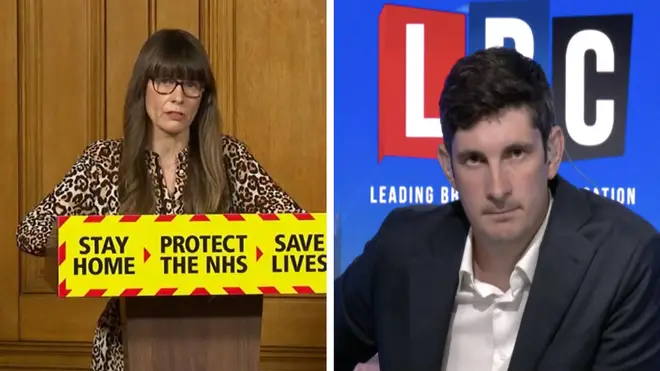
Nick Abbot 10pm - 1am
25 April 2021, 12:12 | Updated: 25 April 2021, 12:18
Dr Susan Hopkins urges people to treat false positive tests as positive
People who get a false positive Covid-19 result with a lateral flow test should still act as though its real until they get a better test, a Test and Trace chief has said.
Dr Susan Hopkins, Covid-19 Strategic Response Director to Public Health England and Chief Medical Adviser of NHS Test and Trace, said around 30% of people who have a lateral flow positive will then go on to test negative.
Currently, anyone who takes a lateral flow test which is positive is invited to have a PCR test at a centre or have one delivered to their home.
Read more: Eight police officers injured as they disperse crowds amid lockdown protest
If the PCR test - which is widely regarded as being more accurate - is negative, they are then released from restrictions.
Dr Hopkins told LBC's Swarbrick on Sunday: "Obviously when the infection rates are very low, the proportion of false positives to true positives changes. However we are still seeing a large number of these convert to PCR positives tests as well.

“Everyone who does a paternal flow test is invited to do a PCR test if it’s positive. And that will allow them to know the true status and be released from restrictions they’re under because of the lateral flow test positivity.
“If the lateral flow test is positive people need to act as if it’s positive.
"That’s what will reduce transmission. We’re still seeing 70% of those people who take a lateral flow and then take a PCR test convert to be positive. That's a high number.
“If we can reduce the transmission of infection in that period where your lateral flow test is positive that will prevent us from having to have further restrictions.”
But Dr Hopkins added the number of false positives may actually be lower than originally thought.
"We can’t say it’s truly a false positive. It may have been positive at the time and then the PCR taken at a later time was then negative," she told Tom.
“Nonetheless we take the PCR as the best test and so we release people if their PCR test was negative.”